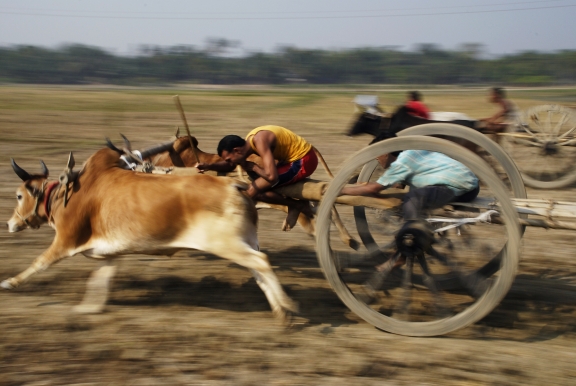It was in the early nineties. Having decided we would create a platform for local photographers, it made no sense to set up our agency in the conventional marketplaces of London, Paris or New York. We had to be where the storytellers were, here in Dhaka. But we also needed to be connected with our buyers. International phone lines were difficult to get, and the calls were expensive. Sending photos by courier was clumsy, slow and prohibitively costly. Alternatives needed to be found. The judging of World Press Photo in Amsterdam provided an opportunity to link up with TOOL, an NGO in the Netherlands that specialized in providing appropriate technology in Majority World countries.

Together we decided to set up a South-South network of like-minded organisations using off-line Email. We assembled our own scanner. We also developed an electronic postbox which allowed us to link up with the Internet. Other providers, Pradeshta and Agni were also trying to get onto the digital highway. Each of us found our own solution, but our off-line email using FidoNet technology became one of the precursors of the digital revolution in Bangladesh. We called it DrikTAP (Drik TOOL Access Point).
The early adopters were amongst the who’s who of Bangladesh. Professor Muhammad Yunus, Professor Rehman Sobhan, Dr. Hameeda Hossain, Dr. Atiur Rahman, Dr. Badiul Alam Majumdar, BUET, The Ministry of Foreign Affairs and UNICEF were amongst the first twenty users. We set up countrywide networks for UNICEF and Grameen Bank. We also launched a fax gateway, whereby people in remote parts of Bangladesh could send faxes to international destinations without having to resort to international calls. The users were all people who recognized the potential of the technology and could visualise the future. We set up an email club where we’d support one another and do our own troubleshooting. Calling ourselves the pioneers of Digital Bangladesh had never entered our minds.
The first ISP providing full-fledged Internet access came in 1996. It was expensive with a 1K connection costing 10 Tk per minute! Still, it did provide access to the digital highway. The government was nowhere on the scene.
Now that ‘Digital Bangladesh’ has become the buzzword that the government brags about at every opportunity, the progress seems to have been on restricting access. The draconian Digital Security Act is clearly a part of the new police state machinery and designed to curb any form of dissent. With elections approaching the Internet is grinding to a halt. Downloads are virtually impossible on Gmail and most users are resorting to VPN for normal Internet activity. Mobile phones are off limits at election time. Facebook and Youtube have been deactivated at key junctures, especially when the government has faced criticism. We’ve also seen Internet being completely switched off to prevent information on rampant abuse of power by the government from being circulated. It is feared that the upcoming elections will bring out the worst in our digital big brother and digital repression seems to be the only technology on offer.
